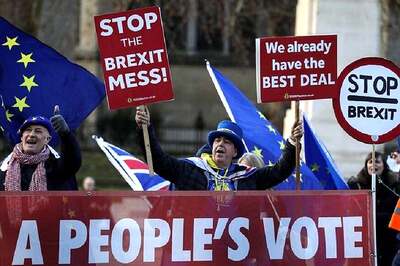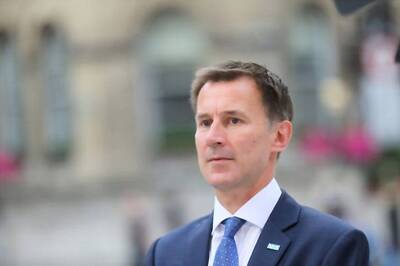
views
___
As Ida leaves Gulf, analysts foresee modest economic damage
WASHINGTON: With more than 1 million customers in Louisiana and Mississippi having lost power, Hurricane Ida is sure to take a toll on the energy, chemical and shipping industries that have major hubs along the Gulf Coast. But the impact on the overall U.S. economy will likely be modest so long as damage estimates dont rise sharply and refinery shutdowns are not prolonged, economists say. The hurricane is expected to inflict a less severe financial impact than Hurricane Katrina did 16 years ago, thanks to a lower storm surge and New Orleans improved levee system, which is better able to withstand storm surges.
___
EU takes US off safe travel list; backs travel restrictions
BRUSSELS: The European Union has recommended that its 27 nations reinstate restrictions on tourists from the U.S. because of rising coronavirus infections there, but EU nations can still allow fully vaccinated U.S. travelers in if they want. The decision by the European Council to remove the U.S. from a safe list of countries for nonessential travel reverses its advice in June, when the bloc recommended lifting restrictions on U.S. travelers before the summer tourism season. The guidance is nonbinding, though, and U.S. travelers should expect a mishmash of travel rules across the continent. Coronavirus deaths have surged in the U.S. recently, rising to over 1,200 a day, and new daily cases are over 150,000 a day.
___
China limits children to 3 hours of online gaming a week
BEIJING: China is banning children from playing online games for more than three hours a week, the harshest restriction so far on the game industry as Chinese regulators continue cracking down on the technology sector. Regulators announced that minors in China can only play games between 8 p.m. to 9 p.m. on Fridays, weekends and on public holidays starting Sept. 1. That limits gaming to three hours a week for most weeks of the year, down from a previous restriction set in 2019 that allowed minors play games for an hour and a half per day and three hours on public holidays. The restriction is part of an ongoing crackdown on technology companies amid concerns that they may have an outsized influence on society.
___
Lithium fuels hopes for revival on Californias largest lake
CALIPATRIA, Calif.: Demand for electric vehicles has shifted investments into high gear to extract lithium from geothermal wastewater around Californias dying Salton Sea. The ultralight metal is critical to rechargeable batteries. Despite widespread availability in the United States, Nevada has the countrys only lithium plant, and U.S. production lags far behind Australia, Chile, Argentina and China. Californias largest but rapidly shrinking lake is at the forefront of efforts to make the U.S. a major global player, though decades of economic stagnation and environmental ruin have left some residents on the Salton Seas receding shores indifferent or wary.
___
US health agency will prod hospitals to cut carbon emissions
WASHINGTON: The Biden administration is launching a new health office that will prod hospitals to cut carbon emissions, aiming to provide greener, more environmentally friendly medical care. Health and Human Services Secretary Xavier Becerra said Monday the new Office of Climate Change and Health Equity will also work with localities to mitigate harmful effects of climate change, such as seniors succumbing to excessive summer heat because their apartments lack air conditioning. Minority communities that often bear a disproportionate impact from environmental problems will get special attention. The health care industry is estimated to account for about 10% of U.S. greenhouse gas emissions.
___
S&P 500, Nasdaq notch more records even as the Dow slips
NEW YORK: Gains for several Big Tech stocks helped push the S&P 500 and the Nasdaq composite to more record highs on Wall Street Monday, even as weakness elsewhere in the market sent the Dow Jones Industrial Average and small-company stocks lower. Energy prices ended were mixed after shooting higher last week as Hurricane Ida headed for the Gulf Coast. Affirm soared 47% after the payments company announced a deal last week with Amazon to offer shoppers a buy-now-pay-later option that doesnt involve credit cards. Bond yields edged lower. The yield on the 10-year Treasury fell to 1.28% from 1.31% late Friday.
___
PNC to raise base wages to $18 an hour, latest bank to do so
NEW YORK: PNC Bank is the latest large U.S. financial services company to increase wages in a bid to keep and attract employees. It is raising its minimum wage to $18 an hour while also giving higher-paid workers a bump in pay. The bank said Monday that the wage increase will apply to both PNC employees as well as those working for BBVA USA, which PNC acquired last year. Base-level PNC employees will see their wages increase from $15 an hour to $18, a 20% pay raise. The increase is more substantial at BBVA, which had an $11 minimum wage before PNC bought the bank.
___
UN hails end of poisonous leaded gas use in cars worldwide
BERLIN: The U.N. environment office says Algeria has become the last country in the world to stop selling highly toxic leaded gasoline. The U.N. Environment Agency said this marks the official end of the use in cars of a fuel thats been blamed for a wide range of human health problems. Petroleum containing tetraethyllead, a form of lead, was first sold almost 100 years ago to increase engine performance. It was widely used for decades until researchers discovered that it could cause heart disease, strokes and brain damage. UNEP cited studies suggesting that leaded gas caused measurable intellectual impairment in children and millions of premature deaths. Most rich nations started phasing out the fuel in the 1980s.
___
The S&P 500 gained 19.42 points, or 0.4%, to 4,528.79. The Dow Jones Industrial Average lost 55.96 points, or 0.2%, to 35,399.84. The Nasdaq added 136.39 points, or 0.9%, to 15,265.89. The Russell 2000 index of smaller companies slipped 11.16 points, or 0.5%, to 2,265.99.
Disclaimer: This post has been auto-published from an agency feed without any modifications to the text and has not been reviewed by an editor
Read all the Latest News, Breaking News and Assembly Elections Live Updates here.




















Comments
0 comment